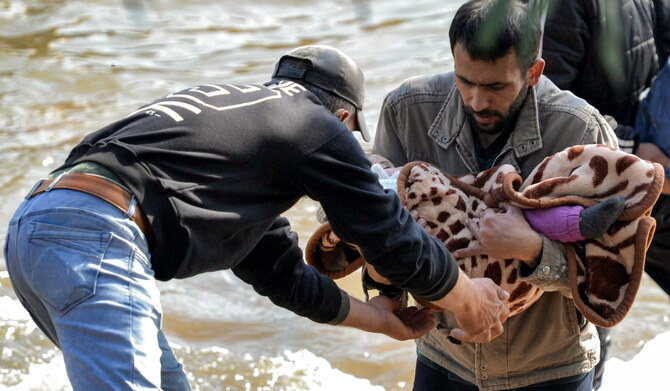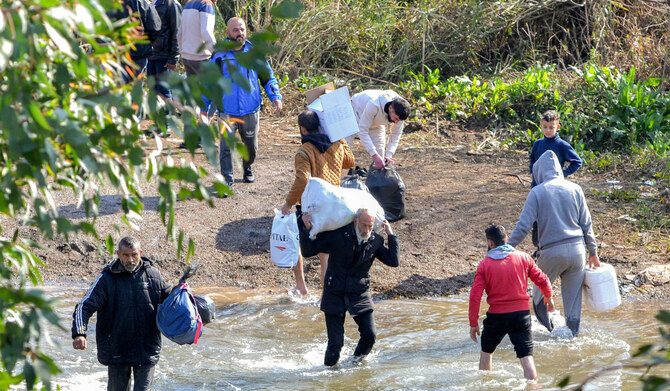MASOUDIYEH, Lebanon: Fearing for their lives, Syrian men, women and children waded through a river to safety in Lebanon on Tuesday, among hundreds of people who have fled to the neighboring country to escape sectarian killing targeting their Alawite community.
A woman who made the crossing on Sunday said she’d seen the bodies of seven slain people in her village. Another said she’d spent three days trapped at home by heavy gunfire. A man said militants had threatened to kill all the people in his village because they are members of the minority Alawite community.
Days after the killing began in Syria’s coastal region, the steady stream of refugees continued: Reuters reporters saw more than 50 cross the knee-high waters of the Nahr El Kabir River into Lebanon during a half-hour period on Tuesday, carrying children and whatever possessions they could gather.
Nada Mohammed, who crossed into Lebanon on Sunday, said her village near the border, Karto, was woken up by a phone call at 4 a.m. from relatives telling her the militants had arrived in the village and she should pack her things.
“We saw seven people they slaughtered,” she said.
Her daughter, Sally Rajab Abboud, described bearded foreigners with long hair who spoke formal Arabic rather than Syrian dialect.
More than 350 families had made the same journey into Lebanon in recent days, according to local Lebanese authorities, fleeing the violence in which the UN human rights office said entire families including women and children had been killed.
Violence began to spread through the coastal region, home to many Alawites, on Thursday, when Syria’s Sunni Islamist-led government said its forces were attacked by remnants of the regime of Syria’s ousted leader Bashar Assad, an Alawite.
Security forces poured into the region to crush the insurrection, while mosques in areas loyal to the government issued calls for jihad, or holy struggle. During violence that followed, the Syrian Observatory for Human Rights says more than 1,200 civilians were killed, the vast majority of them Alawites.
Syria’s interim President Ahmed Al-Sharaa on Monday promised to punish those responsible, including his own allies if necessary. Sharaa said he could not yet say whether forces from the defense ministry — which has merged former rebels into one structure — were involved in the sectarian killings.
Abou Jaafar Sakkour, who fled to Lebanon from the village of Khirbet Al-Hamam near the Lebanese border, said militants had threatened to slaughter its residents because they are Alawites, whose faith is an offshoot of Shiite Islam.
Some of the militants were Syrian while others were foreign, he said. The attackers had ordered the women to leave the village, and declared that it belonged to them.
“What are we guilty of? We want international protection, whether it’s Israel, Russia, from France. Anything that will protect us,” Sakkour said.
Lebanese from nearby Alawite villages assisted the Syrian refugees as they crossed the river into Lebanon on Tuesday.
Lebanon received more than a million Syrian refugees after the eruption of the Syrian conflict in 2011 as people fled Assad’s rule.
Crossing the river with her two children on Tuesday, a woman said she had fled her home in the city of Tartous after being trapped indoors for three days by heavy gunfire.
“We didn’t go out, we didn’t even stand in front of the windows, we shut the curtains, and we didn’t go out at all, all the doors were locked, but we haven’t slept for three nights,” she said, declining to give her name.
“There’s fear.”


















